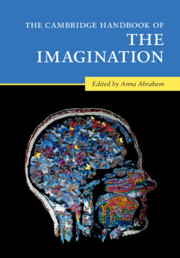Book contents
- The Cambridge Handbook of the Imagination
- The Cambridge Handbook of the Imagination
- Copyright page
- Dedication
- Contents
- Figures
- Contributors
- Acknowledgments
- 1 Surveying the Imagination Landscape
- Part I Theoretical Perspectives on the Imagination
- 2 The Evolution of a Human Imagination
- 3 Material Imagination: An Anthropological Perspective
- 4 The Archaeological Imagination
- 5 Philosophical Perspectives on Imagination in the Western Tradition
- 6 Imagination in Classical India: A Short Introduction
- 7 From Prediction to Imagination
- 8 Memory and Imagination: Perspectives on Constructive Episodic Simulation
- 9 Capturing the Imagination
- 10 A Sociocultural Perspective on Imagination
- 11 Artificial Intelligence and Imagination
- Part II Imagery-Based Forms of the Imagination
- Part III Intentionality-Based Forms of the Imagination
- Part IV Novel Combinatorial Forms of the Imagination
- Part V Phenomenology-Based Forms of the Imagination
- Part VI Altered States of the Imagination
- Name Index
- Subject Index
- References
11 - Artificial Intelligence and Imagination
from Part I - Theoretical Perspectives on the Imagination
Published online by Cambridge University Press: 26 May 2020
- The Cambridge Handbook of the Imagination
- The Cambridge Handbook of the Imagination
- Copyright page
- Dedication
- Contents
- Figures
- Contributors
- Acknowledgments
- 1 Surveying the Imagination Landscape
- Part I Theoretical Perspectives on the Imagination
- 2 The Evolution of a Human Imagination
- 3 Material Imagination: An Anthropological Perspective
- 4 The Archaeological Imagination
- 5 Philosophical Perspectives on Imagination in the Western Tradition
- 6 Imagination in Classical India: A Short Introduction
- 7 From Prediction to Imagination
- 8 Memory and Imagination: Perspectives on Constructive Episodic Simulation
- 9 Capturing the Imagination
- 10 A Sociocultural Perspective on Imagination
- 11 Artificial Intelligence and Imagination
- Part II Imagery-Based Forms of the Imagination
- Part III Intentionality-Based Forms of the Imagination
- Part IV Novel Combinatorial Forms of the Imagination
- Part V Phenomenology-Based Forms of the Imagination
- Part VI Altered States of the Imagination
- Name Index
- Subject Index
- References
Summary
There is a long history of software programs that implement creativity, imagery, and imagination. They are used for generation of entertainment, creation of art, and simulation of the world. Some of these programs are created to shed light on the nature of imagination, and some are explicitly designed to model imagination in humans. These AIs also display a range of domain areas, from the creation of paintings, music, and plot structures, to the generation of entire fictional worlds. AI aids our understanding of imagination in several ways: It provides ideas of how it could work, it tests the feasibility of theories, and brings to light assumptions and new problems that are difficult to generate from theories that are only described in words.
- Type
- Chapter
- Information
- The Cambridge Handbook of the Imagination , pp. 162 - 172Publisher: Cambridge University PressPrint publication year: 2020
References
- 1
- Cited by

